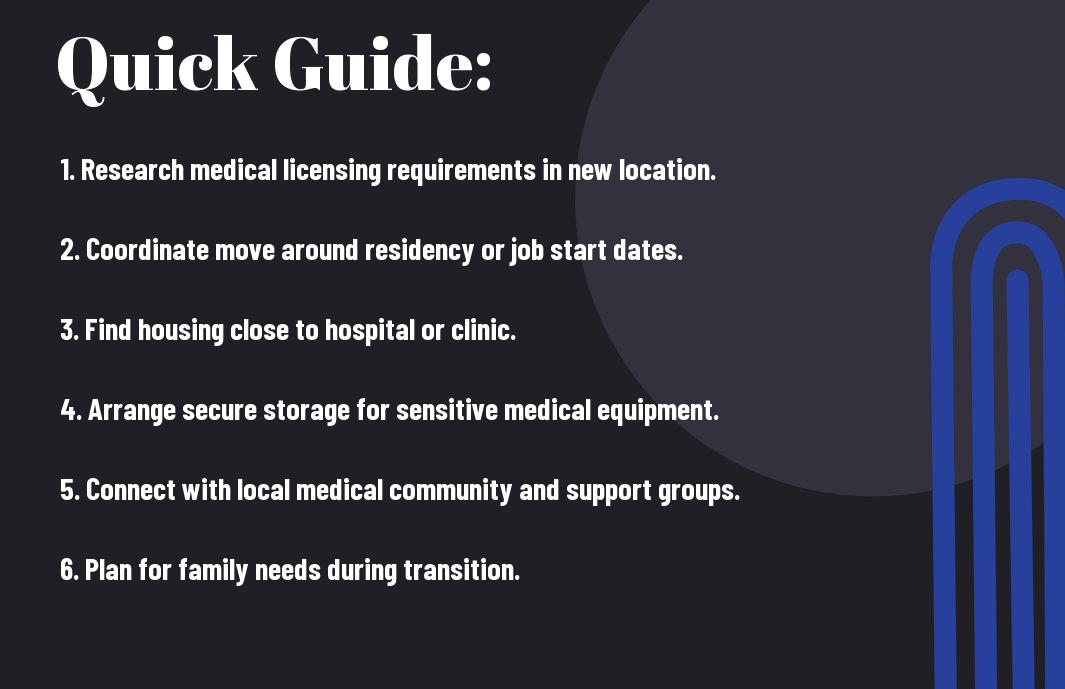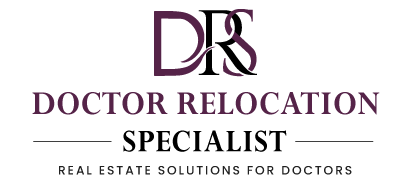Understanding the Medical Professional’s Relocation Journey
Your relocation journey as a medical professional encompasses not just the logistics of moving your belongings but also the complex emotional and administrative aspects tied to your career. Each year, thousands of doctors navigate transitions that require careful coordination with hospitals, clinics, and regulatory bodies. For instance, obtaining new state licenses can take up to six months or more. Additionally, you may encounter challenges such as securing new malpractice insurance or understanding the intricacies of healthcare contracts in your new location. Addressing these factors upfront will pave the way for a smoother transition into your new role.

Unique Challenges Faced by Doctors in Relocation
Relocating as a doctor presents a series of unique challenges that can complicate the transition process. Beyond the typical stresses of moving, you must navigate the intricacies of licensing, ensure you meet hospital or clinic employment requirements, and deal with the specific demands of maintaining your practice standards throughout the transition. Each location may have its own regulatory framework, and adapting can impact your timeline and readiness to start in your new environment. These factors require thorough planning to ensure a smooth move without significant disruptions to your career.
Navigating Licensing and Certification
Acquiring the necessary licensure and certification in your new location can be a lengthy and complex process. Each state has different requirements and timelines, which can create delays if not managed properly. Gathering documentation and undergoing verification can take months, so starting this process early is crucial for a seamless transition to your new role.
Addressing Malpractice Insurance Concerns
Understanding malpractice insurance during a relocation is vital to protect your career and finances. As you move, your coverage may not automatically transfer, requiring you to evaluate options that match your new practice’s scope and regulatory environment.
Most states have distinct malpractice insurance requirements, and you may find that your current policy does not meet the new regulations. Given that premiums vary widely based on location and specialty, it’s wise to research and compare different insurers before making a decision. Additionally, consider any gaps in coverage during the transition period and how to minimize your exposure. Seeking advice from an insurance agent specializing in healthcare professionals can provide insights and help you navigate this crucial aspect of your relocation. Prioritize this task to avoid any unprotected liability while establishing your practice in a new area.
The Impact of Location on Professional Growth
Your choice of location directly influences your professional trajectory in the medical field. Factors such as the availability of healthcare facilities, local patient demographics, and the network of professionals can provide significant advantages. Identifying areas with growth potential can enhance your practice, offering new opportunities to expand your reach and influence in the community.
Proximity to Healthcare Facilities
Being near well-established healthcare facilities can enhance your practice’s credibility and patient trust. Access to hospitals, clinics, and specialized medical centers not only attracts patients but also provides opportunities for collaboration with other professionals, improving your patient care services.
Communities with High Patient Demand
Communities with high patient demand often present lucrative opportunities for growth and expansion. High concentrations of residents typically indicate a greater need for healthcare services, allowing you to establish a robust patient base and increase your practice’s longevity and profitability.
Targeting areas where the population is steadily increasing can yield significant benefits. For instance, towns experiencing growth due to new businesses or educational institutions often attract young families, leading to heightened demand for healthcare services. By positioning yourself in these communities, you not only fulfill a vital need but also enhance your potential for practice success and community integration. Researching demographic trends and local health needs can provide valuable insights into which areas present the best opportunities for your specialty.
Family Considerations and Support Systems
Relocating becomes more complex when considering your family’s needs and support systems. You may face challenges related to your partner’s employment and the educational environment your children will thrive in. Identifying resources and networks in your new community is vital in creating a supportive environment that allows your family to adjust comfortably to the transition.
Education and Schooling for Children
Your children’s education should be a priority during relocation. Research local schools to evaluate their academic performance, extracurricular activities, and community involvement. Consider visiting potential schools, talking to other parents, and reading online reviews to find the best match for your children’s needs and aspirations.
Spousal Employment Opportunities
Job prospects for your spouse can significantly impact your family’s adjustment to a new location. Understanding the local job market while researching potential employers can ensure that both you and your partner feel professionally fulfilled. Investigating industries that are thriving in your new area, such as tech, healthcare, or education, can help your spouse establish connections and explore opportunities for employment.
Networking is often vital in uncovering job opportunities for your spouse. Joining local professional organizations, attending community events, and engaging with industry-specific groups can facilitate job searches and foster connections with potential employers. Additionally, exploring remote work options may broaden your spouse’s opportunities, allowing them to leverage their skills regardless of location while providing flexibility in adapting to the new community dynamics.
Strategies for a Smooth Transition
Creating a seamless transition during your relocation involves a combination of thorough planning, open communication, and utilizing available resources. By taking proactive steps to familiarize yourself with your new environment, connecting with local peers, and accessing support services, you can significantly alleviate the stress often associated with moving. The more prepared you are, the quicker you will feel at home in both your personal life and professional practice.
Leveraging Professional Networks
Building connections with local medical professionals prior to your move can ease your transition significantly. Engaging with platforms like LinkedIn or attending local medical conferences will introduce you to peers who can offer insights about the local healthcare landscape, employment opportunities, and community resources aimed at doctors. Networking is necessary for establishing both professional friendships and mentors in your new location.
Utilizing Relocation Services for Medical Professionals
Specialized relocation services designed for medical professionals can simplify the moving process. These services often include assistance with finding housing, schools, and even navigating the licensing requirements specific to your new state. They understand the unique time constraints you face and can provide tailored solutions to fit your needs. Additionally, many offer stress-relief resources such as orientation tours and community introductions that allow you to quickly acclimate.
Utilizing relocation services tailored for medical professionals can offer you an efficient pathway to settling in. For instance, some companies provide a comprehensive package that includes not only logistical support—like arranging movers and providing packing materials—but also insights into the local job market and healthcare climate. They may even have contacts with local agencies that expedite the credentialing process, ensuring that you can start practicing as quickly as possible. Drawing on their expertise can greatly minimize downtime and ensure a smooth transition for you and your family.
Emotional Well-being During Relocation
Managing your emotional well-being during relocation is imperative for a smooth transition. The stress associated with moving can be overwhelming, especially for medical professionals facing new responsibilities in their careers. Being proactive about your mental health can alleviate anxiety and help you navigate this significant life change more effectively.
Coping with Change and Uncertainty
Embracing the unknown plays a pivotal role in coping with change during your move. Acknowledge your feelings of uncertainty and seek healthy outlets to express them—whether through journaling, exercise, or talking to trusted friends. Focusing on your goals can help you reframe the situation, turning relocation into an opportunity for growth and new experiences.
Building a New Support Network
Establishing a new support network is vital in easing the transition to your new environment. Start by connecting with fellow physicians or members of hospital staff who share similar interests. Engage in local community activities, join professional organizations, or consider participating in social media groups tailored to healthcare professionals in your area. This dedicated effort not only helps forge valuable connections but also aids in creating a sense of belonging in your new location, which can significantly boost your emotional resilience during this time of change.
Summing up
As a reminder, understanding the unique needs of doctors during relocation is vital for a smooth transition. You must consider factors such as proximity to medical facilities, schools, and community resources to ensure a suitable environment for your family. Being aware of the specific challenges you may face in moving can help you plan effectively and make informed decisions. By addressing these needs, you can minimize stress and focus on what matters most—your career and personal well-being in your new community.

